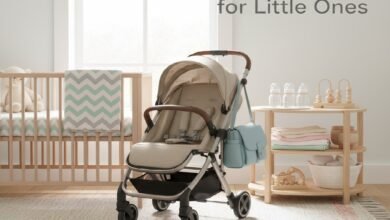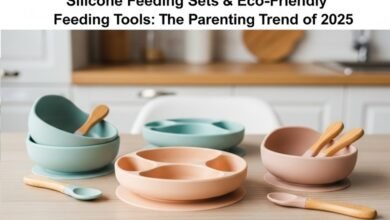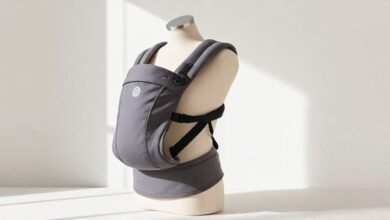Eco-Friendly & Organic Baby Clothes – The Healthier, Trendier Choice for Little Ones
As parents, we always want the best for our babies—comfort, safety, and care. In 2025, with growing awareness about sustainability and health, eco-friendly and organic baby clothes have become one of the top choices for modern families. But are they really better than regular baby clothes? Let’s dive into a detailed review and comparison.
👶 What Makes Organic Baby Clothes Special?
Unlike regular clothes made from synthetic fibers and chemical dyes, organic baby clothes are produced using natural materials like organic cotton, bamboo, or hemp. They are:
- Free from toxic chemicals and pesticides
- Gentle on sensitive baby skin
- Produced through sustainable farming methods
This means your baby not only stays comfortable but also protected from harmful residues often found in conventional fabrics.
🌿 Why Parents Are Switching to Eco-Friendly Options
Parents today are more conscious of what touches their baby’s skin. Eco-friendly baby clothes offer benefits beyond just comfort:
- Health Benefits: Organic fabrics reduce risks of allergies, rashes, and irritation.
- Environmental Care: Made with sustainable farming and low-impact dyes, these clothes reduce environmental damage.
- Long-Term Value: Though sometimes more expensive upfront, organic clothes are durable and last longer.
In short, they’re a win-win for your baby’s health and the planet.
🧵 Popular Fabrics in Organic Baby Clothing
- Organic Cotton – Soft, breathable, and the most popular choice.
- Bamboo Fabric – Naturally antibacterial and moisture-wicking, perfect for sensitive skin.
- Hemp Blends – Strong, durable, and eco-friendly.
- Wool (Organic/Merino) – Ideal for colder climates, keeping babies warm without overheating.
Each fabric has its strengths, but all share the common advantage of being chemical-free and safe.
🆚 Organic vs. Conventional Baby Clothes
When comparing eco-friendly clothes with regular options, the differences become clear.
- Skin Sensitivity: Conventional clothes often use harsh dyes, while organic ones are hypoallergenic.
- Durability: Organic fabrics are usually stronger, while cheap conventional clothes may wear out faster.
- Cost: Regular baby clothes are cheaper, but organic ones provide long-term value.
- Impact on Environment: Organic fabrics are produced sustainably, while synthetic ones contribute to pollution.
👉 If you want affordability and variety, regular clothes still dominate.
👉 But if health, comfort, and sustainability matter most, organic is the better investment.
📈 Baby Fashion Trends 2025 – Sustainability at the Core
The baby fashion industry has fully embraced sustainability as a trend. Parents are no longer just looking for “cute outfits”; they want clothes that align with their values. Current trends include:
- Neutral & Earthy Tones – Beige, olive, cream, and soft pastels dominate eco-friendly collections.
- Minimalist Designs – Simple cuts with a focus on comfort rather than flashy styles.
- Multi-Purpose Outfits – Clothes designed to grow with the baby (adjustable buttons and stretchable fabrics).
- Handmade & Small-Batch Brands – Parents are supporting ethical, small businesses rather than mass-market chains.
This makes organic clothing not just a health choice, but also a fashion statement for eco-conscious families.
💚 Why Parents Love Organic Baby Clothes
- Peace of Mind – No harmful chemicals touching delicate skin.
- Stylish Yet Simple – Trendy earthy designs that feel timeless.
- Eco-Responsibility – Parents feel good knowing they’re reducing their carbon footprint.
- Gift-Worthy – Organic baby clothes are now popular gifts at baby showers.
The emotional value of choosing eco-friendly clothing makes parents feel like they’re doing the best for their child while also protecting the planet.
🛒 Should You Invest in Eco-Friendly Baby Clothes?
The answer depends on your priorities:
- If you’re looking for budget-friendly everyday outfits, conventional baby clothes are more practical.
- If you care about health, skin safety, and environmental responsibility, eco-friendly baby clothes are the smarter choice.
Many parents even mix both—using organic clothes for everyday wear or sleepwear (when the baby’s skin is in close contact for hours), while choosing regular clothes for occasional use.
🌟 Final Verdict
Eco-friendly and organic baby clothes are more than just a fashion trend—they’re a movement towards healthier, more sustainable parenting. While they may cost a little more, the benefits in comfort, durability, and peace of mind make them worth the investment.
In 2025, as eco-conscious living becomes mainstream, dressing your baby in organic clothes is not only about style—it’s about choosing a future that’s safe, sustainable, and filled with care.
👉 For parents who want to balance health, fashion, and responsibility, eco-friendly baby clothes are the perfect fit.



